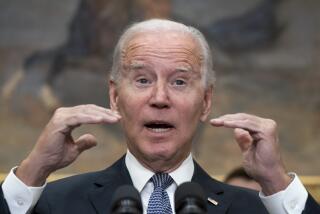Bush Gives Up Pretense of Balancing Budget in Future : Economy: Projection of continued deficits near $200 billion may be the clearest sign yet that no serious debt reduction effort will be made.
- Share via
WASHINGTON — For the first time since the federal government began running massive deficits, a President has given up all pretense of balancing the budget in the future.
Michael J. Boskin, President Bush’s chief economic adviser, acknowledged as much Wednesday in perhaps the clearest sign yet that the Bush Administration has all but abandoned serious deficit reduction efforts.
In a briefing on the annual economic report of the President, which was released Wednesday, Boskin also acknowledged that, even if Congress enacts all of President Bush’s anti-recessionary economic proposals, the government will continue to suffer massive deficits of nearly $200 billion a year through 1997, the most distant year for which the Administration estimates federal spending.
The White House’s short-term estimates for the deficit are much higher than ever before. The Administration forecasts that the deficit will hit a record $399.4 billion in fiscal 1992--nearly $120 billion more than it had predicted a year ago.
Boskin told reporters that the White House decided to stop promising to balance the budget in some future year because Bush “wants to tell it like it is.”
Political observers saw the announcement by the Administration as an important, yet troubling, watershed for American public policy.
“Throughout history, one of the ways that empires have collapsed--Spain, Holland, Britain, for example--is through debt,” noted Kevin Phillips, a Washington political and social analyst. “There came a point in Britain, after World War II, in which the government’s debt became something the country couldn’t deal with and so it was no longer a political issue,” Phillips said.
“We have reached that point in this country now.”
Yet many analysts and congressional leaders admitted mixed feelings about the White House’s deficit projections. In some ways, some said, they found Bush’s new candor refreshing.
It departs from Washington’s decade-long practice of issuing wildly optimistic budget and economic forecasts, which showed huge deficits in the short run but held out the promise of a balanced budget in a rosier future.
In fact, even as deficits soared to new highs throughout the early 1980s as a result of the Ronald Reagan Administration’s tax cuts and military buildup, the White House never flagged in its official belief that its programs would produce such a huge burst of economic growth that a balanced budget eventually would result.
Still, some observers said, Bush’s new budget raises troubling questions about whether it signals that the White House no longer believes that the deficit is a serious political or economic problem.
“The whole implication from this budget is that deficits are less important than they have been in the past . . . that deficits are not on the front burner anymore,” argued Rep. Leon E. Panetta (D-Carmel Valley), the House Budget Committee chairman.
“Ronald Reagan used to put out balanced budgets that we knew were false,” Panetta said. “I don’t think you ought to do that, but you ought to still make a commitment to bringing the deficit down.”
Boskin and other senior Administration officials repeatedly have denied, however, that they are less than serious about deficit reduction.
Instead, they have argued that they are showing a new sense of realism and that Washington will not be able to balance the budget in the future unless Republicans and Democrats find the political will to cut rapidly growing mandatory spending programs such as Medicare, Medicaid and Social Security.
Boskin also said Wednesday that the White House is officially forecasting a modest 2.2% rate of economic growth for 1992. In his briefing with reporters, Boskin said he believes that the economy will be essentially flat in the first quarter and will begin showing signs of recovery in the second three months of the year.
More to Read
Get the L.A. Times Politics newsletter
Deeply reported insights into legislation, politics and policy from Sacramento, Washington and beyond. In your inbox twice per week.
You may occasionally receive promotional content from the Los Angeles Times.










